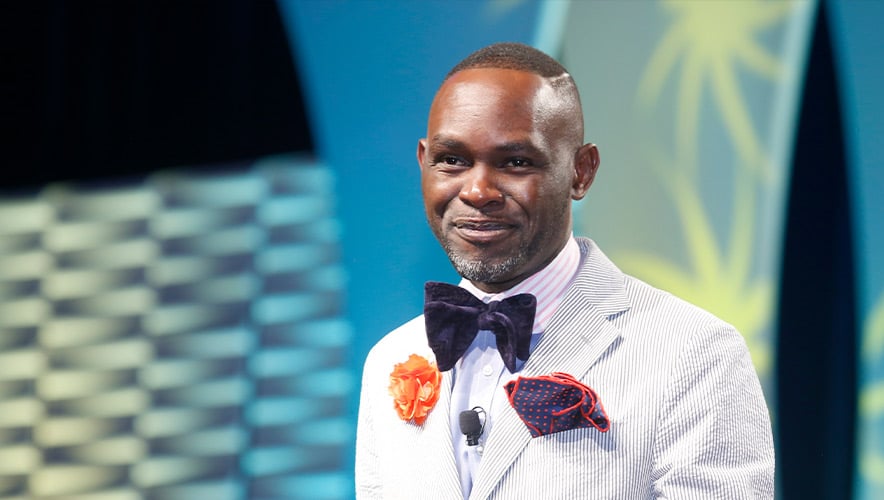Money and Morals: Tallying the True Cost of Discrimination
Are leaders born or are they made? For Derreck Kayongo, the answer is clear: they are made through introspection and facilitating the team’s overall success.
But when confronted by bias, racism, or insensitivity in the workplace, how can leaders step forward to rebalance their teams, protect their organization, and move security forward? At GSX, Kayongo will explore these concepts in his general session on Wednesday, 14 September.
Kayongo has had a noteworthy career so far as an innovative leader. He founded the Global Soap Project in 2009, which recycled soap from hotels that would have otherwise been thrown out to provide it to people in need in 32 countries. Later, he joined the National Center for Civil and Human Rights to serve as its CEO until 2018.
Kayongo’s current focus is on highlighting different viewpoints and measuring the true cost of discrimination. At GSX, he will walk security leaders through how to calculate the cost of discrimination within their teams and their organizations.
Discrimination has two key cost categories, Kayongo says: monetary and moral.
He developed a Discrimination Cost Index to help organizations calculate the known and hidden costs of bias. According to his 2018 article in Financier Worldwide, this includes not only the monetary settlement or result of a court case, but the cost of forming a diversity and inclusion function, the cost of external or internal oversight, damage to the brand, termination of employment for abusive staff members, recruiting new staff, training, effects on market share, and stock market costs.
The costs add up—discrimination and insensitivity are expensive, Kayongo says. In addition, those costs affect the progress a company can make because lawsuits, new departments, and training initiatives take funds away from other programs—including security.
Beyond the monetary cost, discrimination also undermines the moral fiber of an organization and its leadership structure.
Bias and discrimination eliminate trust and respect, Kayongo says. This is currency that companies cannot afford to lose. Brand trust matters even more for consumers than brand love, according to findings from the 2021 Edelman Trust Barometer Special Report: Trust, The New Brand Equity.
The criteria for earning trust from consumers and employees are shaped by cultural shifts in values, and brands that work to change their culture to meet those expectations—rather than relying on the status quo—see a significant lift in trust. If companies fail to keep up with the cultural expectations around diversity and social equity issues, or not issue swift responses to harassment or bias, they may face significant repercussions.
A lack of respect within security teams also translates to a breakdown of communication, which can be devastating to cohesive response and problem solving, Kayongo adds.
“Security needs great teams, and teams that can trust each other to do the right thing,” he says. “If you’re not morally responsible for each other on this security team—or whatever team you’re on—it’s not going to work.”
Adding diversity and having faith in those additional viewpoints can help to accomplish this.
“I really think of diversity as not just an issue of color,” Kayongo says. “It about having a group of people who come from diverse backgrounds so that your lens is bigger and you can view things from different parts of understanding of humanity and life. If you are monolithically built as a team, chances are you’re going to see things through a very small lens, and that may not give you the full vision of problems to solve or what markets need.”
A single additional viewpoint could vastly change the outcome of a security decision, Kayongo says, citing a female analyst that supported U.S. forces in the hunt for al Qaeda leader Osama bin Laden.
“Because of her ability to see things differently from her vantage point, that diversity was able to give [U.S. forces] the courier who was actually responsible for taking messages back and forth to Osama bin Laden in Pakistan,” he adds. “You have to learn to trust varied voices, even when you’re in security. If your security team is just men, you’re just going to have that viewpoint.”
Security leaders will need to analyze what points of view are available to them, and if a vantage point is missing, they can work with their HR teams to look for talent that fits those requirements.
Leaders can also have faith in their employees’ ability to leverage their perspectives to develop solutions so that diverse talent isn’t just hired—it is valued and supported, Kayongo notes. This is an area where every leader can continue to grow, whether their team is growing.
“Everything in life begins with one person, and that person is you,” Kayongo says. “Nothing happens in the world if you don’t participate and if you don’t believe in yourself as a person. We have to go back and rededicate ourselves to why we really are at our workplace, what is our role there, and how are we improving the environment in which we are working. Don’t wait for somebody revolutionary for come and give you the magic wand—things happen by you participating.”
For more insights from Derreck Kayongo, attend his keynote during the general session on Wednesday, 14 September, at 11:15 a.m. ET. A livestream for GSX Digital attendees will also be available.
Claire Meyer is managing editor of Security Management, the publisher of the GSX Daily. Connect with her on LinkedIn or via email at [email protected].
